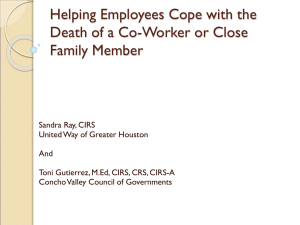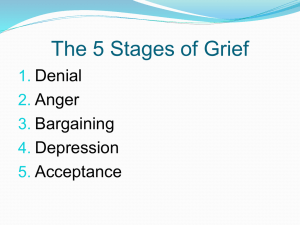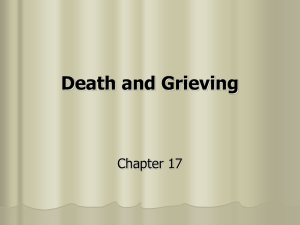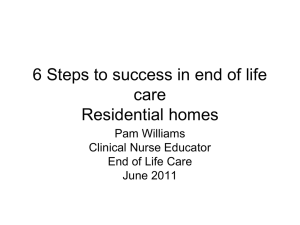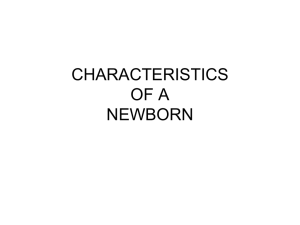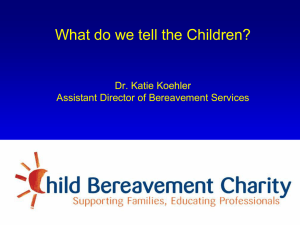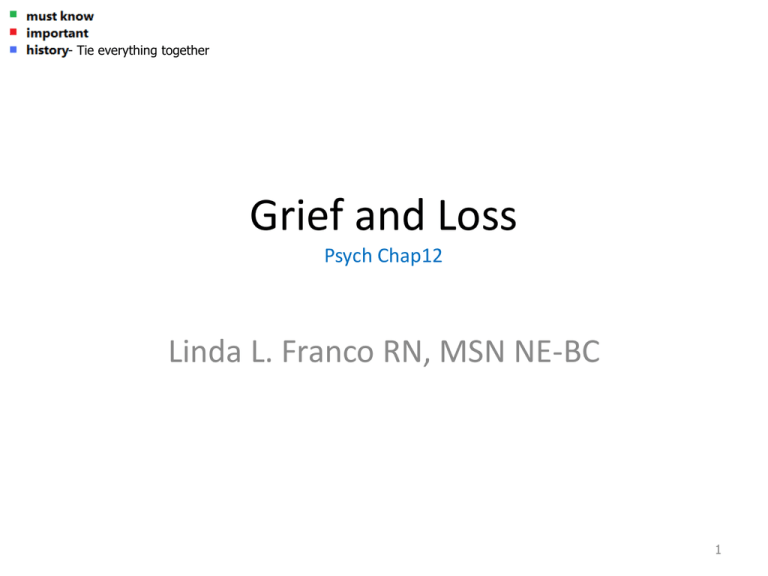
- Tie everything together
Grief and Loss
Psych Chap12
Linda L. Franco RN, MSN NE-BC
1
Definitions of Grief, pg 216
• Grief - subjective emotions and affect that
are a normal response to loss
• Grieving/bereavement- process of
experiencing grief
• Anticipatory grief - facing imminent loss
• Mourning - outward sign of grief
2
•
•
•
•
•
•
•
•
•
•
•
•
Perinatal loss is death of a fetus or infant from the time of conception through the
end
of the newborn period 28 days after birth. Intrauterine fetal death (IUFD) after 20
weeks
gestation is often referred to as stillbirth or fetal demise.
Common causes of perinatal loss – the incidence of fetal death after 20 weeks in
the
United States is 6.8 per 1000 total births, accounting for 50% of all perinatal deaths
(Magann, Chauhan, Bofill, 2002). Over 80% of stillbirths occur before term, with
more
than 50% occurring before 28 weeks’ gestation (Cunningham, 2001). Factors
associated
with perinatal loss can be fetal factors, maternal factors or placental /other (cord
accidents,
twins from assisted fertility technology, amniocentesis, genetic testing, etc) factors.
May
be unknown or related to preeclampsia, eclampsia, abruptio placentae, placenta
previa,
diabetes, congenital anomalies, renal disease, cord accidents, fetal growth
restriction,
and alloimmunization.
3
2:40
• Grief and loss are essential in
life; relinquishing and moving
on happen as we grow and
develop
Grief and loss are
uncomfortable
4
Types of Losses, pg 216
• Can be planned, expected, or sudden:
– Physiologic (loss of limb)
– Safety (domestic violence, posttraumatic stress
disorder, breach of confidentiality)
– Security/sense of belonging (relationship loss [death,
divorce])
– Self-esteem (ability to work, children leaving home)
– Self-actualization (loss of personal goals, such as not
going to college, never becoming an artist or a dancer)
5
Theories of the Grieving Process
all pretty similar...
•
•
•
•
Kuber Ross’s 5 stages of grieving
Bowlby’s 4 phases of grieving
John Harvey’s 3 phases of grieving
Rodebaugh’s 4 stages of grieving
• Similarities among theorists
• Not all clients follow predictable steps or
make steady progress
6
Kubler-Ross’s 5 stages of grieving
1) Denial (shock and disbelief)- may ask for 2nd
opinion
2) Anger (toward God, relatives, healthcare providers)
3) Bargaining (trying to get more time, prolonging the
inevitable loss)- bargain w/ God
4) Depression (awareness of the loss becomes acute)weeping and withdraw, changing H levels may
compound the stage.
5) Acceptance (person comes to terms with
impending death or loss)- can take months to yrs
7
•
•
Denial – Even when the initial healthcare provider suspects fetal demise,
the couple is hoping a second opinion may be different.
•
•
•
Anger – results from feelings of loss, loneliness, and perhaps guilt. The
mother may attempt to identify a specific event that caused the death
and may blame herself.
•
•
•
Bargaining – More common when the death is anticipated. It is marked
by the couple making mental trade-offs in exchange for the fetus being
healthy.
•
•
•
Depression – Evidenced by preoccupation, weeping, and withdrawal.
Changing hormonal levels in the first 24 to 48 hours after birth may
compound the depression and associated grief.
•
•
Acceptance – Occurs when resolution occurs. This stage is highly
individualized and may take months to years to complete.
8
Bowlby’s 4 phases of grieving
1) Numbness and denial of the loss
2) Emotional yearning for lost loved one
and protesting permanence of loss
3) Cognitive disorganization and emotional
despair
4) Reorganizing and reintegrating sense of
self
9
John Harvey’s 3 phases of grieving
1) Shock, outcry, and denial
2) Intrusion of thoughts, distractions, and
obsessive reviewing of loss
3) Confiding in others to emote and
cognitively restructure
10
Rodebaugh’s 4 stages of grieving
1)
2)
3)
4)
Reeling
Feelings
Dealing
Healing
11
6:35
Tasks of the Grieving Process
• Undoing psychosocial bonds to loved
one and eventually creating new ties
• Adding new roles, skills, and behaviors
• Pursuing a healthy lifestyle
• Integrating the loss into life
12
Cultural Considerations
• All cultures grieve
• Rituals and habits surrounding death vary
among cultures
– Expression of sadness expressed
– Time mourning should last
– Many rituals have roots in religion
• Nurses should be sensitive to cultural
differences
13
African Americans
Typically view the body in church
Hymns, poetry, eulogies
Public prayer
Wearing black clothing
Decreasing social activities
14
Muslim Americans
Muslims do not permit cremation
Follow 5 steps of burial procedure
Haitian Americans
Practice vodun or calling on spirits
to make peace
15
Chinese Americans
Strict norms for announcing death,
preparing the body, arranging the funeral
and burial
Burning incense and reading scripture
assist the spirit of the deceased on his or
her journey
16
Japanese Americans
Buddhists view death as a life passage
Bathing and purification rites are
performed
Friends and family visit, bringing gifts or
money
Prayers are said
Incense is burned
17
Filipino Americans
Often Catholic
Wear armbands or black clothing
Place wreaths on casket
Black banner on the deceased’s home
Prayers and blessings for the soul of the
deceased
18
Vietnamese Americans
Predominately Buddhist
Deceased bathed and dressed in black
Rice and money sent with the deceased
View the body before burial at home
19
Hispanic Americans
Predominately Catholic
Pray for the soul during a rosary
Mourning may involve wearing black
and decreasing social activities
A wake in the home may be held
20
Native Americans
Variety of practices depending on religious
beliefs and practices of different tribes
Death seen as a state of unconditional love
Believe deceased is going on a journey
Celebrations may include a ghost meal
Mourners encouraged to be happy for the
person
21
Orthodox Jewish Americans
Leaving a dying person alone is a sign
of disrespect
Burial must occur within 24 hours unless
delayed by the Sabbath
Body should be untouched until rites
can be performed by family, rabbi, or
Jewish undertaker
22
8:50
Disenfranchised Grief
• Grief over a loss that is not or cannot be openly
acknowledged, mourned publicly, or supported
socially:
A relationship has no legitimacy – lovers, samesex relationships
The loss itself is not recognized - prenatal death,
abortion, pet, job
The griever is not recognized - older adults,
children, nurses
23
Complicated Grieving
• Response that lies outside the norm of
grieving in terms of extended periods of
grieving: responses that seem out of
proportion or responses that are void of
emotion
24
Story…-14:00
Vulnerable to complicated grieving
– Low self-esteem
– Low trust in others
– A previous psychiatric disorder
– Previous suicide threats or attempts
– Absent or unhelpful family members
– An ambivalent, dependent, or insecure
attachment to the deceased person
25
Increased risk for complicated grieving,
b/c they are such a lrg part of their life
– Death of a spouse or child
– Death of a parent (particularly in early
childhood or adolescence)
– Sudden, unexpected, and untimely death
– Multiple deaths
– Death by suicide or murder
26
Complicated Grieving
• Physical reactions can include:
– Impaired immune system (due to the stress)
– Increased adrenocortical activity
– Increased levels of serum prolactin and growth hormone
– Psychosomatic disorders
– Increased mortality from heart disease (can become at
risk themselves)
• Emotional responses can include:
–
–
–
–
Depression
Anxiety or panic disorders
Delayed or inhibited grief
Chronic grief
27
Potential Nursing Diagnoses
• Grieving
• Anticipatory grieving
• Dysfunctional grieving
28
Nurse’s Role
•
•
•
•
Recognition of signs of grief
Support client
Therapeutic communication
Promote the expression and release of
emotional and physical pain
• Encourage effective use of grieving behaviors
– Praying, staying with body, rituals, memorial
service
29
Communication and interpersonal skills
to assist grieving:
– Use simple, nonjudgmental statements
– Refer to a loved one by name
– Appropriate use of touch
– Respect client’s process of grieving and personal
beliefs
– Be honest, dependable, consistent, and worthy
of client’s trust
– Offer a welcoming smile and eye contact
30
Perinatal Loss
• A child that loses a parent is an orphan,
• A man who loses his wife is a widower, a
woman who loses her husband is a widow,
• However, there is no name for a parent that
loses a child, for there is no word to describe
such pain.
31
Definitions
• Perinatal loss: Death of a fetus or infant from
the time of conception through the end of the
newborn period of 28 days after delivery.
• IUFD: intrauterine fetal death after 20 weeks
often referred to as stillborn or fetal demise.
32
Common Causes of Perinatal Loss
•
•
•
•
Fetal Factors
Maternal factors
Placental factors
Unknown
33
The Bereaved Family’s Bill of Rights
• You have the right to expect your grief to be acknowledged in
a professional and compassionate manner.
• You have the right to be an educated consumer, to have all
the requirements and options explained to you.
• You have the right to ask all the questions and receive honest
answers.
• You have the right to express your needs, emotional, religious,
and spiritual, and have the funeral director listen and facilitate
your requests accordingly.
• You have the right to plan a meaningful funeral ritual, tailored
to your beliefs, customs, and traditions.
34
19:15
Rights of the Infant
• To be recognized as a person who was born
and has died.
• To be named.
• To be seen, touched, and held by the family.
• To have the end of life acknowledged.
• To be put to rest with dignity.
35
20:40
Nurses are a Powerful Influence!!!
We encounter families experiencing loss in
many settings:
Inpatient - antepartum, L & D, postpartum,
nursery, NICU, emergency rooms,
med/surg recovery care
Outpatient – clinics, offices, infertility,
OB/GYN, family practice,
pediatrician
36
Death of Dreams
It does not matter how long the pregnancy
lasted, it is still a loss of the personhood of
that child.
6 weeks, 6 months, 6 days – it was a child, it was
a hope, it was a dream not fulfilled
37
Confirmation of Death
• Many times mom notices a decrease or
stoppage of fetal movement.
• No heart tones
• No cardiac activity on US
• Will have drop of estriol levels in the blood
38
Responding to Grieving Families
• Remember the 3 H’s
Hug
Hush
Hang around
39
What you can say:
•
•
•
•
•
“I’m sad for you”
“How are you doing with all of this”?
“This is hard for you”
“What can I do for you”?
“I’m sorry”
40
What Not to say
• “You’re young, you can have more
children”
• “You have an angel in heaven”
• “This happened for the best”
• “Better for you now, before you knew the
baby”
• “ There was something wrong with the baby
anyway”
• Calling the baby a “fetus” or “it”
41
How you Can Help
•
•
•
•
•
Listen
Touch
Cry with the family
Attend the funeral/memorial service
Remember them on their baby’s due date,
birthday, and death day etc
• Never forget
42
Remembrances You Can Give the
Family
•
•
•
•
•
•
Baby ring
Planter/flowers in a baby vase
Original poem
Tree or rose bush as a living memorial
Donation to a memorial fund
Photographs keepsakes
43
Preparing the Family for the Birth
•
•
•
•
•
•
Hospital room away from other laboring moms
Label patients door
Keep couple together
Same nurse
Encourage to express their feelings
Encourage the parents to see, touch, and name their
baby
• Spiritual support
• Cultural support
44
Preparing for the Birth
•
•
•
•
•
Timing of the induction/delivery
Method of delivery
Medications for induction
Comfort measures
Immediate care of newborn and mom
following delivery
45
Nursing Care of the Baby
The baby is washed and dressed
It is wrapped and made to look like a sleeping
infant
Defects are minimized if possible
Parents will usually ask for the baby several
times
46
27:08
Discharge Care of the Family
Remembrance box or package
Pictures
Early discharge
Lactation suppression
Community referrals/resources
Funeral arrangements or body disposal
47
Difficult Times for Parents
•
•
•
•
Anniversaries/holidays
Due date
Death date
Growth and development milestones
48
Suggestions for Bereaved Parents
• Name the baby
• Find out the sex of the baby if possible
• See the products of conception to make baby more
real
• Don’t get rushed out of the hospital
• See and hold your baby as many times as you want
• Have your baby baptized or blessed according to
your religious beliefs
• Have a memorial service
49
Suggestions for Remembrance
• Do a baby book
• Have pictures taken
• Save some mementoes such as footprints,
hair, ID bracelets, clothing
• Wear a remembrance of your baby
• Plant a tree or plant
• Buy a Christmas ornament with your baby’s
name
50
Suggestions for Memorial Service
• Draw a picture of your child’s face and write
poetry for the service
• Write a letter to your baby or God.
• Have your baby shown in a cradle at the
funeral home or in your home
• If you have cremation, have it done after
visitation and funeral
51


